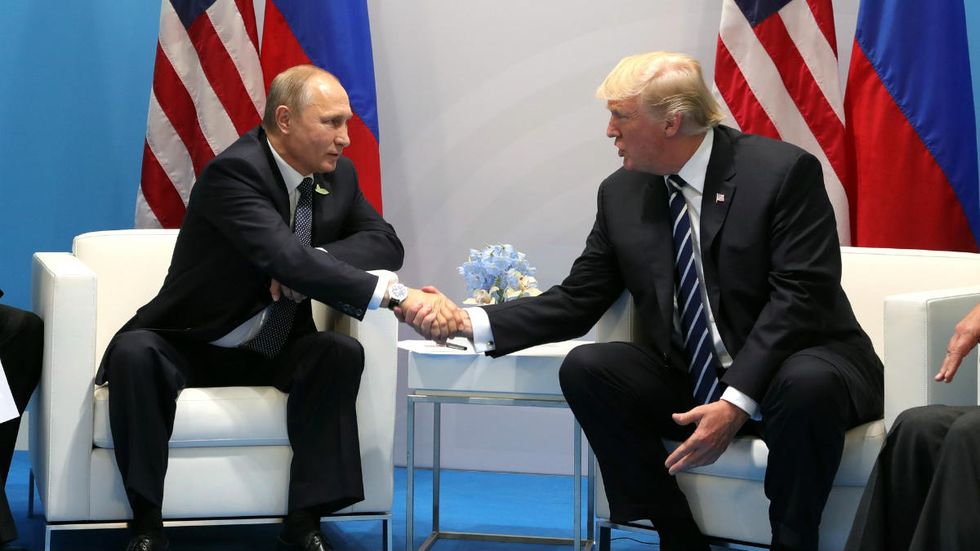
© 2024 Blaze Media LLC. All rights reserved.
It’s on. President Trump and Russian President Vladimir Putin will meet face to face on July 16 in Helsinki, Finland, the White House announced Thursday. This isn’t the first time the two leaders have met in person. In fact, they have met multiple times on the sidelines of international summits in Vietnam and Germany.
The announcement comes one day after national security adviser John Bolton met with Putin in Moscow, where the two discussed the U.S.-Russia relationship and international issues.
The White House has not yet released agenda items for the scheduled Trump-Putin meeting. However, there are several issues involving U.S.-Russia relations and foreign policy goals that could potentially be discussed.
Iran
As part of the Trump administration’s strategy to isolate and pressure the terrorist regime in Tehran, the United States would be wise to attempt to break apart the strategic partnership between Russia and Iran. Russia serves as an economic lifeline to Iran’s increasing isolation, especially given that punishing sanctions have forced Tehran into a corner. If the United States can somehow convince Russia to roll back business with Iran, the regime’s path to collapse will be accelerated exponentially, thus mitigating the nuclear threat posed by Tehran.
Syria
Russia is fighting in tandem with Iran, Shiite militants, and the Assad regime to try to keep the dictatorship in Damascus afloat. This has served to protect the Iranian regime’s land and air bridge from Tehran to Beirut, which is used to deliver sophisticated weapons and aid to terrorist groups like Hezbollah and Hamas. Assad is an incredibly weak dictator and has no reach beyond his borders, and he has become a proxy for Russia’s and Iran’s interests. As an expansion of the Trump administration’s Iran strategy, the U.S. should seek to separate Russia from Iran in Syria as well.
North Korea
Russia is one of the few trading partners with the regime in Pyongyang, which means that Moscow can play a large role in convincing North Korea to denuclearize.
Crimea
The United States opposes Russia’s annexation of Ukraine’s Crimea, which happened in 2014 under President Obama. Russia’s claims to the Crimean peninsula trace back to its history as a Russia-controlled territory. The Kremlin also claims that residents in Crimea prefer to be governed under the Russian Federation. Opponents of the annexation counter by pointing out that Russia cannot simply forcibly reclaim territory not its own, and it is in violation of international law. Nonetheless, it will be difficult to almost impossible to convince the Russians to back away from Crimea, given its strategic importance and economic value.
Fighting radical Islam
Jihadi extremism has plagued both Russia and the United States in the 9/11 era. Both countries have been subject to Islamic terror attacks both within their boundaries and in their respective foreign engagements.
Both Trump and Putin have openly discussed cooperating to tackle Islamic extremism as the fight against the global jihadist movement continues to press forward around the world.
Russian meddling in U.S. elections
The Russian president vehemently denies that Moscow meddled in the 2016 election. He’s backed by the reality that there is no evidence for the bombastic accusations put forward by Democrats and the Clinton campaign that Russia somehow tipped the scales of the election to throw the presidency to Donald Trump.
However, there is sufficient evidence that Russia did (and continues to) attempt to sow discord in American politics, with the goal of turning Americans against each other and destabilizing our civil society. Russia continues to perceive the United States as an adversary that needs to be weakened. Therefore, the Kremlin has ordered cyber attacks and disinformation campaigns to target the United States. President Trump needs to make it clear to President Putin that intruding into U.S. matters is a breach of our sovereignty and will not be tolerated. President Obama refused to respond to Russian cyber attacks and intrusions. President Trump can make it clear that he will not be so lenient.
#mc_embed_signup{background:#fff; clear:left; font:14px; }
/* Add your own MailChimp form style overrides in your site stylesheet or in this style block.
We recommend moving this block and the preceding CSS link to the HEAD of your HTML file. */
Want to leave a tip?
We answer to you. Help keep our content free of advertisers and big tech censorship by leaving a tip today.
Want to join the conversation?
Already a subscriber?
more stories
Sign up for the Blaze newsletter
By signing up, you agree to our Privacy Policy and Terms of Use, and agree to receive content that may sometimes include advertisements. You may opt out at any time.
© 2024 Blaze Media LLC. All rights reserved.
Get the stories that matter most delivered directly to your inbox.
By signing up, you agree to our Privacy Policy and Terms of Use, and agree to receive content that may sometimes include advertisements. You may opt out at any time.


